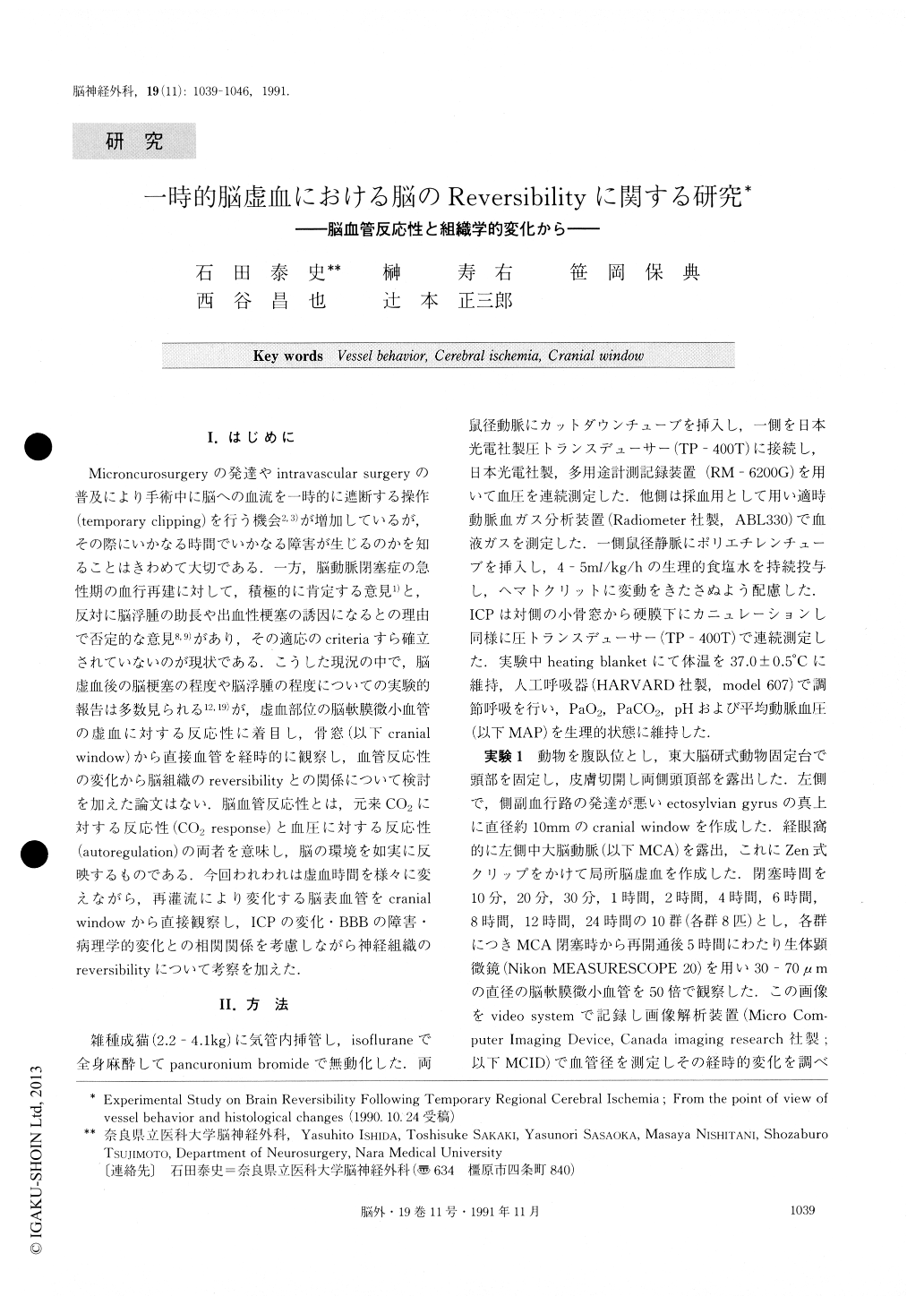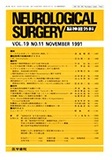Japanese
English
- 有料閲覧
- Abstract 文献概要
- 1ページ目 Look Inside
I.はじめに
Microncurosurgeryの発達やintravascular surgeryの普及により手術中に脳への血流を一時的に遮断する操作(temporary clipping)を行う機会2,3)が増加しているが,その際にいかなる時間でいかなる障害が生じるのかを知ることはきわめて大切である.一方,脳動脈閉塞症の急性期の血行再建に対して,積極的に肯定する意見1)と,反対に脳浮腫の助長や出血性梗塞の誘因になるとの理由で否定的な意見8,9)があり,その適応のcriteriaすら確立されていないのが現状である.こうした現況の中で,脳虚血後の脳梗塞の程度や脳浮腫の程度についての実験的報告は多数見られる12,19)が,虚血部位の脳軟膜微小血管の虚血に対する反応性に着目し,骨窓(以下cranialwindow)から直接血管を経時的に観察し,血管反応性の変化から脳組織のreversibilityとの関係について検討を加えた論文はない.脳血管反応性とは,元来CO2に対する反応性(CO2 response)と血圧に対する反応性(autoregulation)の両者を意味し,脳の環境を如実に反映するものである.今回われわれは虚血時間を様々に変えながら,再灌流により変化する脳表血管をcranialwindowから直接観察し,ICPの変化・BBBの障害・病理学的変化との相関関係を考慮しながら神経組織のreversibilityについて考察を加えた.
Abstract
Using a middle cerebral artery occlusion model in adult cats, we investigated the ischemic time threshold for inflicting damage on cerebral vessel behavior and brain tissue.
With the transorbital approach, a middle cerebral artery (MCA) was exposed and temporarily obstructed by a Zen's clip. Animals were divided into ten groups (each group : N = 8) according to the ischemic time of 10, 20, 30 minutes, 1, 2, 4, 6, 8, 12, 24 hours. Five hours after the recanalization, Evans' blue dye was injected intravenously and after further 30 minutes, the brain was fixed with transaortal perfusion for histological ex-aminations. A cranial window was made above the ectosylvian gyrus which has poor anastomosis. The pial vessel behavior was observed through the cranial win-dow and evaluated using an intravital microscope and a videoangiometer. Considering the correlation between functional change of vessel behavior and pathological change in the brain, the threshold time of ischemia in-flicting irreversible damage was estimated.
In the 30 minute ischemia group, deterioration of ves-sel behavior began to be observed as well as extravasa-tion of Evans' blue dye. As the ischemic duration be-came longer, infarction and hemorrhage, which showed close correlation, increased. When the duration of ische-mia was 6 hours, the infarcted area was significantly larger than that of the 4-hour ischemia group. Intracra-nial pressure (ICP) markedly increased as soon as re-canalization took place. We think this phenomenon is due mainly to swelling. About three hours after recana-lization, ICP further increased due to severe vasogenic edema in addition to the brain swelling.
From the point of view of a clinician, these results suggest that temporary clipping during operation should be limited to 20 minutes or less, and that suffi-cient administration of antiintracranial hypertensive drugs is significant during recanalization of the artery.

Copyright © 1991, Igaku-Shoin Ltd. All rights reserved.


